在XX年高三英语备考经验交流会上的典型发言
高考英语经验交流发言稿
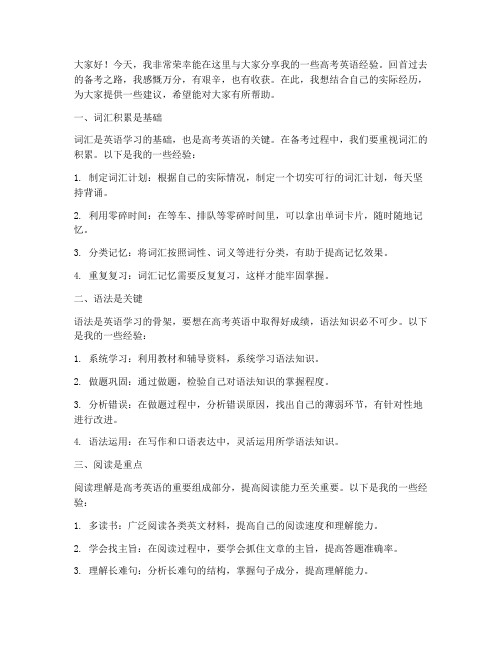
大家好!今天,我非常荣幸能在这里与大家分享我的一些高考英语经验。
回首过去的备考之路,我感慨万分,有艰辛,也有收获。
在此,我想结合自己的实际经历,为大家提供一些建议,希望能对大家有所帮助。
一、词汇积累是基础词汇是英语学习的基础,也是高考英语的关键。
在备考过程中,我们要重视词汇的积累。
以下是我的一些经验:1. 制定词汇计划:根据自己的实际情况,制定一个切实可行的词汇计划,每天坚持背诵。
2. 利用零碎时间:在等车、排队等零碎时间里,可以拿出单词卡片,随时随地记忆。
3. 分类记忆:将词汇按照词性、词义等进行分类,有助于提高记忆效果。
4. 重复复习:词汇记忆需要反复复习,这样才能牢固掌握。
二、语法是关键语法是英语学习的骨架,要想在高考英语中取得好成绩,语法知识必不可少。
以下是我的一些经验:1. 系统学习:利用教材和辅导资料,系统学习语法知识。
2. 做题巩固:通过做题,检验自己对语法知识的掌握程度。
3. 分析错误:在做题过程中,分析错误原因,找出自己的薄弱环节,有针对性地进行改进。
4. 语法运用:在写作和口语表达中,灵活运用所学语法知识。
三、阅读是重点阅读理解是高考英语的重要组成部分,提高阅读能力至关重要。
以下是我的一些经验:1. 多读书:广泛阅读各类英文材料,提高自己的阅读速度和理解能力。
2. 学会找主旨:在阅读过程中,要学会抓住文章的主旨,提高答题准确率。
3. 理解长难句:分析长难句的结构,掌握句子成分,提高理解能力。
4. 做题技巧:掌握阅读理解的做题技巧,如排除法、归纳法等。
四、写作是提升写作是英语学习的重要组成部分,要想在高考英语中取得好成绩,写作能力不可忽视。
以下是我的一些经验:1. 多练习:多写英语作文,提高自己的写作水平。
2. 分析范文:学习优秀范文,掌握写作技巧。
3. 注意格式:熟悉高考英语作文的格式要求,确保卷面整洁。
4. 修改润色:写作完成后,仔细检查,修改润色,提高作文质量。
总之,备考高考英语需要付出努力和时间。
高三英语备考经验交流发言稿英语
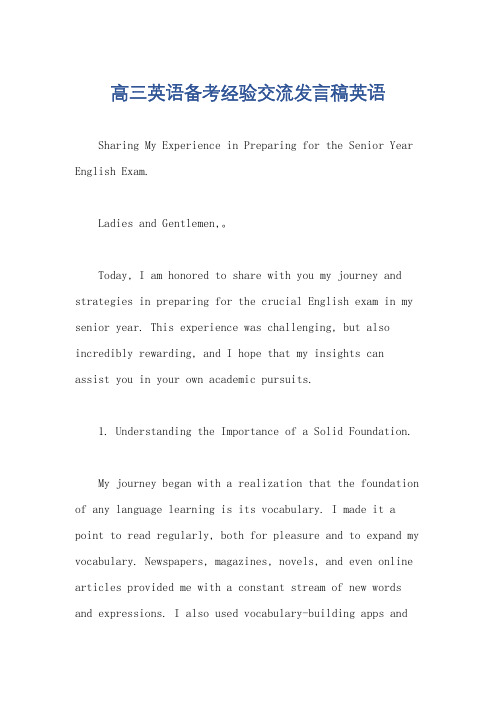
高三英语备考经验交流发言稿英语Sharing My Experience in Preparing for the Senior Year English Exam.Ladies and Gentlemen,。
Today, I am honored to share with you my journey and strategies in preparing for the crucial English exam in my senior year. This experience was challenging, but also incredibly rewarding, and I hope that my insights canassist you in your own academic pursuits.1. Understanding the Importance of a Solid Foundation.My journey began with a realization that the foundation of any language learning is its vocabulary. I made it a point to read regularly, both for pleasure and to expand my vocabulary. Newspapers, magazines, novels, and even online articles provided me with a constant stream of new words and expressions. I also used vocabulary-building apps andgames to make the process more enjoyable and engaging.2. The Power of Practice.Practice was key in honing my language skills. Istarted by setting aside a specific time every day for English practice, whether it was reading, writing, speaking, or listening. I engaged in mock tests and writing exercises to familiarize myself with the question formats and time constraints. This consistent practice helped me identify my weak areas and focus my revision efforts accordingly.3. Mastering Grammar.Grammar is often a tricky aspect of language learning, but I found that understanding its logic and rules made it easier to apply. I invested time in revising and understanding the basic principles of grammar, and then moved on to more complex structures. Regular practice of grammar exercises and sentence correction helped me internalize these rules and apply them naturally in my writing and speaking.4. Reading Comprehension.Reading comprehension is a crucial skill for theEnglish exam. I developed this skill by reading a widerange of materials, from simple newspapers to complexliterary works. This diverse reading exposure helped me understand different writing styles, perspectives, and vocabularies. I also practiced reading comprehension exercises regularly, focusing on improving my speed and accuracy.5. Writing Skills.Writing is another area that requires constant practice.I started by writing simple essays and gradually moved onto more complex writing tasks. I emphasized on clarity, coherence, and the effective use of vocabulary and grammar. Regular revision and feedback from teachers and peers were invaluable in improving my writing skills.6. Listening Skills.Listening is often overlooked, but it is a crucialskill for English language learning. I listened to English podcasts, news, and movies to improve my listening comprehension. I also practiced listening comprehension exercises, focusing on improving my ability to understand spoken English at different speeds and accents.7. Managing Stress and Staying Motivated.Lastly, managing stress and staying motivated are crucial aspects of successful exam preparation. The senior year can be extremely stressful, but it is important to find ways to relax and recharge. I found that setting realistic goals, rewarding myself for small achievements, and sharing my progress with friends and family kept me motivated and positive.In conclusion, my journey in preparing for the senior year English exam was challenging but rewarding. I believe that with a solid foundation, regular practice, and effective strategies, anyone can achieve success in thisexam. Thank you for listening to my share, and I hope that my experience can inspire and assist you in your own academic journey.。
高三英语备考交流发言稿

高三英语备考交流发言稿
尊敬的老师和同学们,
大家好!今天我想和大家分享一些关于高三英语备考的经验和
交流心得。
首先,备考英语的重要性不言而喻。
英语作为一门基础学科,
不仅在高考中占据重要比重,而且在日常生活和职场中也具有重要
的应用价值。
因此,我们需要全方位地提升自己的英语能力。
其次,备考英语的关键在于打好基础。
我们需要熟练掌握英语
的基本语法规则和词汇,同时注重培养听、说、读、写的综合能力。
在备考过程中,多进行模拟测试和真题练,不断积累经验和提高应
试能力。
此外,备考英语需要有科学的时间安排和良好的研究方法。
我
们应该合理规划时间,将重点放在重要知识点和弱项上。
同时,使
用多种研究资源,如课本、电子资料、英语研究网站和英语影视剧等,来提高英语研究的效果。
除了研究知识,我们还要注重英语口语的训练。
英语口语是考
试中的一个重要环节,也是我们与外国人交流和应对口语考试的关键。
我们可以通过参加英语角、与外教交流、模拟口语考试等方式,提高自己的口语表达能力。
最后,备考英语的过程需要坚持和耐心。
高三很紧张,我们可
能会遇到各种困难和挑战,但我们一定不能放弃。
通过坚持不懈的
努力和持续的复,我们一定可以取得好成绩。
希望我们可以相互支持和鼓励,在备考中一起进步。
让我们共
同努力,在高考中取得优异的英语成绩,为我们的未来奠定坚实的
基础。
谢谢大家!。
高考英语备考交流发言稿(精选5篇)

高考英语备考交流发言稿(精选5篇)高考英语备考交流篇1大家好。
冬去春来,又到春暖花开,万物复苏的季节,高三同学的英语复习也已进入二轮复习阶段。
在距高考百日的时间里,如何备考英语,才能起到事半功倍的效果?这是我们每位同学非常关心的问题。
作为一位老教师,我愿意和同学们在此一起共同探讨这一问题。
一、端正心态,战胜自我,自强不息心有多高,命就有多大。
二轮复习已是决战高考的冲刺阶段。
同学们都在争分夺秒,激流勇进。
但也有同学出现学习效率不高,停滞不前,甚至于有少数同学对英语学习失去信心,抱着破罐子破摔的想法。
我认为关键时期,师生们要同舟共济,互相激励;有一种积极向上、乐观睿智的心态;同学们要战胜自我,自强不息,克服自卑,树立信心,尽快走出高原区,迎接柳暗花明的无限春光。
二、继续扩大词汇量,重在提升词汇活用能力俗话说“巧妇难为无米之炊”。
词汇量的多少直接影响我们的英语成绩。
说实话,我们很多同学还没有达到《考试大纲》要求的3000词汇量,迄今为止部分同学甚至连一些常用的词汇都不能正确使用。
语法知识掌握也不够扎实。
因此,我们在二轮复习中要巩固所学知识,强化记忆,进一步扩大词汇量。
单词复习最好做到词不离句,句不离文。
高考越来越重视词汇在具体语境中的应用,不拘泥那种仅从单词本身出发的较为死板的考法。
以“cover”为例,在不同的语境中就有不同的用法。
Don’t cover your eyes with hands.( vt.覆盖、遮住) He made up a story to cover the mistakes.(vt.掩饰) China covers a total area of 96000000 square kilometrers.(vt占地) The cover of the magazine is green.(n.封面) His book covers a wild field. (vt.涉及) They covered 100 miles a day.(vt.走过) The journalist was sent to cover the traffic accident.(vt.采访) 由cover一词可见,具体语境对于词汇学习不可小觑。
在高三英语备考小组经验交流会上的讲话
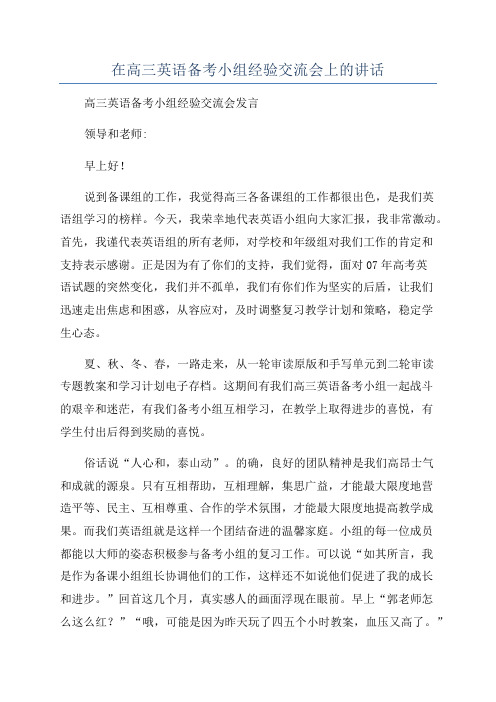
在高三英语备考小组经验交流会上的讲话高三英语备考小组经验交流会发言领导和老师:早上好!说到备课组的工作,我觉得高三各备课组的工作都很出色,是我们英语组学习的榜样。
今天,我荣幸地代表英语小组向大家汇报,我非常激动。
首先,我谨代表英语组的所有老师,对学校和年级组对我们工作的肯定和支持表示感谢。
正是因为有了你们的支持,我们觉得,面对07年高考英语试题的突然变化,我们并不孤单,我们有你们作为坚实的后盾,让我们迅速走出焦虑和困惑,从容应对,及时调整复习教学计划和策略,稳定学生心态。
夏、秋、冬、春,一路走来,从一轮审读原版和手写单元到二轮审读专题教案和学习计划电子存档。
这期间有我们高三英语备考小组一起战斗的艰辛和迷茫,有我们备考小组互相学习,在教学上取得进步的喜悦,有学生付出后得到奖励的喜悦。
俗话说“人心和,泰山动”。
的确,良好的团队精神是我们高昂士气和成就的源泉。
只有互相帮助,互相理解,集思广益,才能最大限度地营造平等、民主、互相尊重、合作的学术氛围,才能最大限度地提高教学成果。
而我们英语组就是这样一个团结奋进的温馨家庭。
小组的每一位成员都能以大师的姿态积极参与备考小组的复习工作。
可以说“如其所言,我是作为备课小组组长协调他们的工作,这样还不如说他们促进了我的成长和进步。
”回首这几个月,真实感人的画面浮现在眼前。
早上“郭老师怎么这么红?”“哦,可能是因为昨天玩了四五个小时教案,血压又高了。
”新邮件到了,是吴红林老师发给我的。
“小马,在我的眼睛看清楚之前,我会把整理好的教学计划发给你。
请大家指教。
”邮件是22:57发出的。
长期需要吃开音丸的张老师,坚持在课余时间给返校的美术生补课。
作为一名两个班的老师,王的任务很重,所以他每次都能把精力放在评价上。
第二天他很了解学生的成绩,试卷分析,学生答案分析。
吴丹老师负责阅读项目的选题,一周做了几十篇阅读。
刘成敏老师是高三第一次教书,但她勤奋好学,逐渐成熟,在班上的英语成绩有了显著提高。
高三英语复习经验交流发言稿
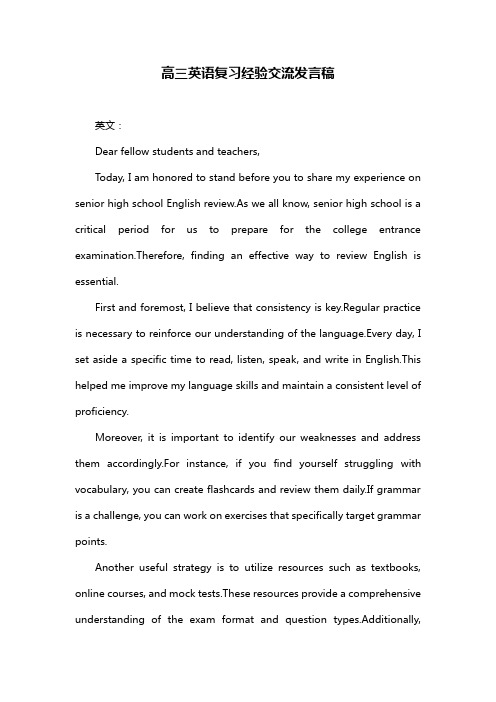
高三英语复习经验交流发言稿英文:Dear fellow students and teachers,Today, I am honored to stand before you to share my experience on senior high school English review.As we all know, senior high school is a critical period for us to prepare for the college entrance examination.Therefore, finding an effective way to review English is essential.First and foremost, I believe that consistency is key.Regular practice is necessary to reinforce our understanding of the language.Every day, I set aside a specific time to read, listen, speak, and write in English.This helped me improve my language skills and maintain a consistent level of proficiency.Moreover, it is important to identify our weaknesses and address them accordingly.For instance, if you find yourself struggling with vocabulary, you can create flashcards and review them daily.If grammar is a challenge, you can work on exercises that specifically target grammar points.Another useful strategy is to utilize resources such as textbooks, online courses, and mock tests.These resources provide a comprehensive understanding of the exam format and question types.Additionally,joining an English study group can be beneficial as it allows for peer learning and encourages a healthy competitive environment.Lastly, I would like to emphasize the importance of staying motivated.English learning can be challenging at times, but it is crucial to remember why we are putting in the effort.Visualize your goals and believe in your ability to achieve them.In conclusion, effective English review in senior high school requires consistency, identifying weaknesses, utilizing resources, and maintaining motivation.I hope my experience can be of some help to you all.Thank you for your attention.中文:亲爱的同学们和老师们,今天,我很荣幸能站在这里与大家分享我在高三英语复习方面的经验。
高三英语经验交流发言稿

高三英语经验交流发言稿高三英语经验交流发言稿范文在生活中,发言稿的使用频率越来越高,发言稿特别注重结构清楚,层次简明。
写发言稿的注意事项有许多,你确定会写吗?以下是店铺整理的高三英语经验交流发言稿范文,欢迎大家借鉴与参考,希望对大家有所帮助。
高三英语经验交流发言稿1复习总体思路我校高三英语备考整体上本着:一轮全盘抓基础,二轮专练促能力,三轮模拟练考感的工作思路。
通过大量读背输入,力求最好的能力输出,通过适量的试题训练,力求最好的语用效果。
简言之,xx年高考春季备考攻略:一抓两重,抓基础,重阅读,重写作。
1、做最好的题近几年的高考真题就是最好的练习题。
其次是大型联考题,比如我们六市联考题。
一定要抛弃一切烂题。
高考真题有很高的含金量。
如果把教材里的课文比作风平浪静的池塘,那么高考的阅读文章就是惊涛骇浪的大海。
高考真题选材好,词汇选择准,语言运用真,语法句式妙,设题清晰,不模糊。
高考真题总能让我们回味无穷,相比之下,很多模拟题却给我们白开水的感觉,形似容易,神似难。
复习一定要做真题、用心去研究真题、感悟真题。
高考阅读语篇是丰富多彩的,是一个永不枯竭的知识宝库,学单词,学语法,抓基础,提能力,尽在其中。
在复习之初,我们定的目标是:实验班做完五年高考真题,普通班做完三年真题。
现在的实施情况基本是在计划之中。
2、练最漂亮的字字体漂亮老师愉悦,字迹脏差无人问津,这一点阅卷老师有深刻体会。
高三学生练什么字体,如何练字,如何练字效果好,这都需要去摸索,去实践。
上学期一开始我们就从字母练起,狠抓一个月字母规范练习,老师示范,督促学生字母书写过关,然后依次练短语,练句子,练篇章。
下一步重点抓整体效果。
由于一些老师不够重视,班与班之间存在有差距。
3、上最高效的课什么是高效的英语课?当然是容量大,重复率高,学生才能收获多。
我校三年级分实验班、二个普通段、复习段,共有四个年级段,所以四个备课组集体备课,集体研讨。
课堂上精讲少讲,把时间和思维还给学生。
高三英语备考经验交流发言稿范文
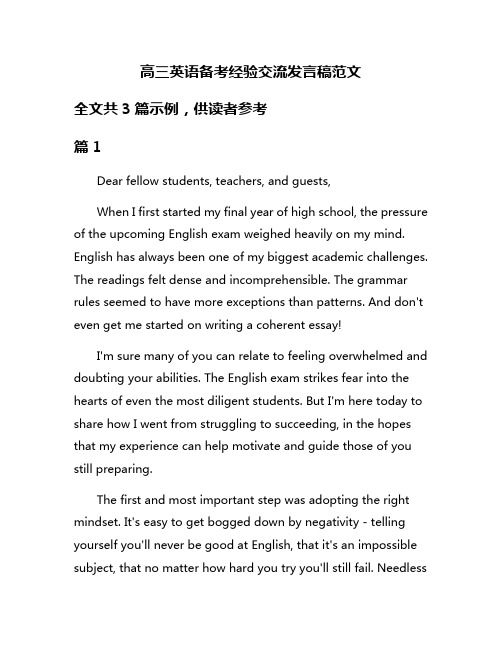
高三英语备考经验交流发言稿范文全文共3篇示例,供读者参考篇1Dear fellow students, teachers, and guests,When I first started my final year of high school, the pressure of the upcoming English exam weighed heavily on my mind. English has always been one of my biggest academic challenges. The readings felt dense and incomprehensible. The grammar rules seemed to have more exceptions than patterns. And don't even get me started on writing a coherent essay!I'm sure many of you can relate to feeling overwhelmed and doubting your abilities. The English exam strikes fear into the hearts of even the most diligent students. But I'm here today to share how I went from struggling to succeeding, in the hopes that my experience can help motivate and guide those of you still preparing.The first and most important step was adopting the right mindset. It's easy to get bogged down by negativity - telling yourself you'll never be good at English, that it's an impossible subject, that no matter how hard you try you'll still fail. Needlessto say, this defeatist attitude is self-sabotaging. You have to believe in your ability to improve and meet the challengehead-on.I started listening to positive affirmations and telling myself things like "I am becoming more fluent every day" and "I have what it takes to master this." It may sound cheesy, but gradually changing my inner voice from negative to positive gave me the determination to persevere.The next crucial step was developing a consistent study routine. I began waking up an hour earlier each day to go through English practice questions over breakfast. During any free periods at school, instead of goofing off, I reviewed grammar rules and vocabulary lists. In the evenings after dinner, I spent two focused hours on writing practice essays.At first, sticking to this schedule was tough. There were days I slacked off because I was too tired or found any excuse to procrastinate. But I recommitted myself each time I slipped up. Habit formation is challenging, but absolutely vital for meaningful progress. Even on days I didn't feel like it, I still studied English for a minimum amount of time.In addition to consistent routine, I realized I needed a variety of learning strategies to keep things engaging. I watched videosand shows in English, read short stories and articles, made digital flashcards, and even started a language exchange partnership with a native speaker. Mixing up your study methods helps reinforce concepts in multiple ways.I also adopted better time management approaches like the Pomodoro technique to maximize my productivity. During each 25-minute work period, I gave English my full, undivided attention. Taking short, scheduled breaks helped me stay focused for longer periods overall.As I put in consistent effort week after week, progress was slow but noticeable. Passages that used to confuse me became more understandable. Writing became less of a chore. My confidence grew as I overcame previous stumbling blocks.Of course, the journey wasn't always easy. There were still many moments of frustration when I struggled with complex topics. At one point, I nearly gave up because I felt I had plateaued and my effort wasn't paying off.But I kept persevering, tweaking my approach when necessary. When my old study habits became stale, I switched to new ones. When certain concepts continued to elude me, I sought out tutoring assistance. The path of self-improvement is rarely linear - embrace the ebbs and flows.As the English exam date drew closer, my nerves kicked in. All the doubts and fears I had pushed aside resurfaced. What if I froze up during the test? What if I had prepared incorrectly and bombed the entire thing?To combat the dread, I focused on measurable progress through practice tests. Seeing my scores increase was proof that my efforts were paying off. On exam day itself, I did breathing exercises, visualized success, and approached it like any other practice run.When I finally received my English score, I had performed in the top percentile - a massive improvement from where I started. The feeling of validation and accomplishment overcame me. All those early wake-ups, late nights, moments of self-doubt - they were all worth it in the end.My English journey exemplified the saying "life's battles don't always go to the strongest or fastest; sooner or later the person who wins is the one who thinks they can." With the right mindset, consistent habits, varied strategies, and determination to overcome obstacles, any goal is achievable.While my aim was improving at English, the skills I developed - self-discipline, time management, productive mindset, and grit in the face of challenges - are applicable to anyendeavor. The commitment and methods that helped me eventually succeed with English can help all of you tackle your own Everest, whether that's acing exams, mastering extracurriculars, or pursuing future dreams.So to any of you fearing the English exam or struggling to make headway - don't lose hope. Approach it with a positive attitude, create sustainable study habits, diversify your methods, adjust when you plateau, and persevere through difficulties. You are capable of far more than you realize.Thank you for your time, and best of luck to everyone continuing their English journeys! I'll be happy to answer any specific questions during our Q&A session.篇2Fellow students, teachers, and guests, I'm honored to share my experiences and insights on preparing for the all-important English exams we face as third-year seniors.To begin, I think it's important to be fully honest - the road ahead is incredibly challenging. The exams we'll face test our English abilities to the absolute maximum across reading, writing, listening, and speaking. Scores on these exams can open doorsto our dream universities or slam them shut. The pressure is immense.However, I'm here to tell you that with the right mindset, strategies, and work ethic, you can emerge successful. My journey has been filled with obstacles, but also key lessons that allowed me to continuously improve my English.The first key is to maintain a growth mindset at all times. Language learning is an incredible mental marathon, requiring stamina and resilience. There will be times when you feel like you're making no progress, when grammar rules seem to melt your brain, and when you're swimming in endless vocabulary words. In those moments, remind yourself that struggles are natural, and that each challenge is an opportunity to stretch your abilities.Developing a growth mindset helped me overcome many frustrations. I distinctly remember agonizing over the dozen different uses of the word "get" and its various particles. How could such a simple word be so maddeningly complex? By embracing that struggle as part of the learning process rather than a personal failing, I was able to power through and internalize those distinctions.The second critical factor is understanding your unique learning style and playing to your strengths. Some students are auditory learners who thrive by listening to dialogues and lectures. Others are visual learners who benefit from charts, graphs, and videos. I found that I lean towards being a kinetic learner - I make the most progress when I'm actively doing activities like writing practice essays or acting out dialogues.Capitalizing on being a kinetic learner, I started keeping an English journal to work on my writing daily. I found conversation partners to practice spoken exchanges. I even acted out dialogue scenes from movies to build verbal fluency. Diagnosing your ideal learning channels allows you to gain English mastery far more efficiently.My third key learning was managing my time and prioritizing effectively. With the endless sea of vocabulary, grammar patterns, Writing banks, and practice tests, it's easy to feel overwhelmed. However, I learned that a bit of upfront planning prevented me from aimlessly bouncing between tasks.At the start of each week, I made a study schedule that dedicated enough time to each exam area based on my weaknesses. For example, knowing my writing was relatively strong, I allocated 15% of my time to Writing and 30% to thegrammatic nitty-gritty of Reading, my weakness. This focused, prioritized approach kept me from wasting time and allowed me to systematically tackle my English Achilles' heels.The fourth key was actively applying lessons into authentic English environments. It's easy to know grammar rules or vocab words in a vacuum, but applying them in real contexts is what separates theoretical knowledge from true mastery.Whenever possible, I tried to immerse myself in English media. I watched TV shows and movies without subtitles to build listening skills. I read English books, magazines and news sites to reinforce my reading abilities. I listened to English music and podcasts to soak up natural dialogues. This made English feel less like an academic subject and more like a living, breathing language.My fifth major learning was understanding the optimal mindset for exams themselves. Test-taking is its own skill, quite separate from one's technical English abilities. The highest scorers know how to manage their time, requisite analytical strategies, and avoid careless mistakes.For the Reading section, I learned to nihilistically eliminate any incorrect answers first before evaluating the remaining choices. For Writing, I outlined and organized my essays in a waythat logically flowed. For Listening, I practiced with varied accents and speech patterns to avoid missing key details. Having a game plan for each section ensured I applied my English skills optimally.Finally, my biggest piece of advice - never go it alone. We're all in this marathon together, and pooling our collective knowledge helps everyone improve. Form study groups where you can bounce ideas, explain concepts to each other, and collaborate. When you get stuck, ask for help from teachers, tutors, or even online communities. Iron sharpens iron - surrounding yourself with supportive teammates is invaluable.In those darkest moments of the journey when the challenges feel insurmountable, I drew strength from my peers who shared the same goal of English mastery. We'd have group motivation sessions where we visualized walking across that graduation stage, having conquered the English exams. Don't be afraid to open up about your struggles and insecurities - that vulnerability breeds empathy and perseverance.My friends, I stand before you today with full confidence that each of you can achieve greatness on the English exams. The path will be arduous and demand your complete focus and dedication. However, by combining a growth mindset, timemanagement, prioritization, immersive practice, strategictest-taking, and a supportive network of peers, you will be poised for success.As I look back on these transformative years, I see a journey of frustrations and triumphs. But more importantly, I've gained a level of perseverance and grit that will benefit me immensely in whatever future paths I pursue. For that, I have these English exams to thank - they've molded me into someone ready to confront any challenge head-on.I wish you all the very best as you embark on this final stretch. Stay focused, stay determined, and stay united alongside your classmates. Develop a mastery of English, and you will unlock not just desired test scores, but a future of borderless communication and opportunity. The road is difficult, but those capable of walking it are truly unstoppable.Thank you.篇3Fellow Students,As we enter the final stretch of our high school journey, the reality of the upcoming English exam weighs heavily on many of our minds. It's a daunting challenge, one that can make or breakour dreams of attending our desired universities. However, I'm here to share my personal experiences and insights, in the hopes that they may provide some solace and guidance as we navigate this pivotal phase.First and foremost, let me assure you that the path to success is paved with unwavering dedication and a growth mindset. The English language is a vast and complex tapestry, woven with intricate grammar rules, idiomatic expressions, and cultural nuances. Mastering it requires more than just memorizing vocabulary lists or practicing sample tests; it demands a genuine passion for learning and a willingness to immerse ourselves in the language.One of the most valuable lessons I've learned is the importance of consistency. Studying English shouldn't be a sporadic endeavor, reserved only for the weeks leading up to the exam. Instead, it should be a continuous journey, a daily habit that becomes ingrained in our routines. Whether it's reading a chapter from an English novel, listening to a podcast, or engaging in conversation with a language partner, the key is to embrace every opportunity to expose ourselves to the language.In my experience, finding a study method that resonates with our individual learning styles is crucial. Some of us maythrive with visual aids, such as flashcards or mind maps, while others may prefer auditory techniques, like listening to English songs or watching movies without subtitles. Experiment with different approaches, and don't be afraid to step outside your comfort zone. The more diverse our learning methods, the deeper our understanding of the language will become.Additionally, I cannot overemphasize the importance of practice, practice, and more practice. The English exam is not merely a test of knowledge; it's a test of our ability to apply that knowledge under pressure. Simulate exam conditions by timing yourself while answering past papers, and don't shy away from seeking feedback from teachers or peers. Identify your weaknesses and work tirelessly to transform them into strengths.Amidst the intense preparation, it's easy to become overwhelmed and discouraged. During these moments, remember to prioritize self-care. Take breaks, engage in activities that bring you joy, and surround yourself with a supportive network of friends and family. A healthy mind and body will undoubtedly contribute to a more focused and productive study session.Moreover, I encourage you to embrace a collaborative spirit. English is a language meant to be shared and experiencedtogether. Form study groups, engage in discussions, and challenge each other's understanding. Not only will this reinforce your knowledge, but it will also foster a sense of camaraderie, reminding us that we're all in this together.As we approach the final stretch, let us not lose sight of the bigger picture. The English exam is not the ultimate destination; it's merely a stepping stone on our journey towards personal growth and self-discovery. Regardless of the outcome, the skills and resilience we've cultivated through this process will serve us well in the years to come.In closing, I leave you with a quote from Nelson Mandela: "Education is the most powerful weapon which you can use to change the world." Let us wield our knowledge of the English language as a tool for understanding, empathy, and global connection. Embrace the challenges ahead with courage and determination, and know that each of us has the potential to shape our own destinies.Thank you, and best of luck to us all.。
- 1、下载文档前请自行甄别文档内容的完整性,平台不提供额外的编辑、内容补充、找答案等附加服务。
- 2、"仅部分预览"的文档,不可在线预览部分如存在完整性等问题,可反馈申请退款(可完整预览的文档不适用该条件!)。
- 3、如文档侵犯您的权益,请联系客服反馈,我们会尽快为您处理(人工客服工作时间:9:00-18:30)。
在XX年高三英语备考经验交流会上的典型
发言
我所在的是**高中,我们的生源一般,在各校录取分数线以下分数线以下。
XX年的高考中,我校高三毕业班的学生在**老师的精心指导下取得了优异的成绩,无论是文科英语还是理科英语都名列全市同类学校的前矛,文科英语更获得了全市第11名的学校历史最好成绩。
我们认为成绩属于过去,希望在于明年。
今天我代表**十四中高三备课组的全体教师主要谈三点:
一、过去成功的主要经验
1、领导重视,方向明确。
我们学校高三管理的重要理念就是:以教师为主导,以学生为主体,以管理为重点,以质量为根本。
学校领导一直把高三工作当作学校的重中之重,把高考成绩当作学校的生命线,对高三给以极大的关注。
从人力的配备,服务措施上都为此倾斜,给迎战高考的广大师生创造了令人舒适的环境。
2、团结合作,形成合力。
“众人划桨开大船”。
我们上届高三英语备课组在这种思想的指导下,群策群力,奋力拼搏,高三备考中,工作扎实认真,“统一备课,统一进度,统一测试,统一讲评”。
具体就是坚持“日日练、周周练、每周的限时阅读训练和隔
天听写的”做法实际效果很好。
3、学生刻苦,善于学习。
我们上届学生只有四个班级,学生人数少,自费生比较少,便于管理。
学生普遍善于动脑,刻苦学习,班级学习风气浓厚。
09年高考早已远去。
我们对一年的工作感到最大的欣慰就是能大部分工作按计划落到实处,在细微之处更显各位老师的踏实;能紧随形势的变化,及时调整;能充分调动学生,引导学生用好手头资料;能充分调动英语科代表的工作热情,引导他们配合老师把工作做好。
最后是全体教师能同心协力,发挥各自的智慧和集体的力量,把备考工作圆满完成。
二、现在的做法
1、制定切实可行的计划。
俗话说得好,凡事“预,则立;不预,则废。
”因此,高三一开学,我们就集全组的意见,制定了我们一年的大体框架。
制定了以“扎扎实实打基础,全面提升出成绩”的复习原则。
我们的原则就是:立足基础,提升能力;巩固基础和专题训练相结合。
2、集体备课出效益。
我们这个教研组汇聚了学校英语学科的精兵强将,能力突出,经验丰富。
我们干什么事情都注意发挥集体的智慧。
我们认为,发挥备课组的合力作用,因为团队的力量将是取
得优异高考成绩的保证。
在整个教学过程中,我们首先要强化备课组意识,背好课才是上好课的基础。
我们每天都在同一个办公室里讨论教学中出现的问题,使问题都及时得到了解决。
其次,做到信息互通,资源共享,并且保持与各校的交流与合作,主动吸收来自各方面的信息,积极参加市教研活动,以扩大视野,更好、合理利用学校教导处提供的和来自各兄弟学校交流取得的资料。
3、具体的做法:
1)加强语篇训练,进行限时阅读,注重学生解题思路的灵活性,培养应试解题技巧。
每周一晚自修集体进行阅读组题测试,满度接近**市模拟考试和浙江省高考试题的完形填空、阅读理解、短文改错,测试后及时讲评。
从我们目前已经进行的三周测试的效果看,已经达到了我们预期的效果—让学生发现不足,让学生明确奋斗的目标,让学生提升语言运用的能力;
2)重视词汇的落实,坚持隔天听写的做法。
另外,每两周考按高考考纲的字母序号考高考词汇表的词汇,满分100分。
我们认为《高考英语词汇手册》中要求的词汇、句型一定要牢牢地掌握,这是语言学习的基础。
3)每周末布置学生理出《本周错题集》,每周10-20题,这样学习起来才不盲目,复习有方法,考试也有方法。
4)我们的课时安排:我们每周7节课,四节安排高三
新课教学;二节安排语法复习,主要资料为学校为我们备课组提供的《五年高考三年预测》和备课组集体分工制作的教学课件;一节课安排高一、高二的复习,使用的教学用书为《高中总复习导与练》。
我们的目标:努力做到“温故而知新”,使学生基础扎实、能力突出。
三、反思:将基础教学和尖子生培养进行到底
我们必须结合新课程标准改革的趋势和高考英语学科改革的要求以及今后一年的高三教学历程,我们应该把基础教学和尖子生培养进行到底。
主要体现在以下五个方面的具体措施上:
1、应以课本为主,结合教辅同步复习各册内容,快速归纳总结和讲解课本里的重点、难点词汇、句型和语法知识等,一单元一单元,一册一册过关,把知识网络扎实地结好。
高三教学应回归自然。
2、加强重点学生的跟踪管理。
我们要争取学校、家长和学生的配合做好重点学生的跟踪管理,多培养几个考上重点大学的学生,提升本科率,争取为**的教育事业做出更大的贡献。
3、针对浙江省高考阅读理解主要根据英文原版报刊和网络信息进行改变而组稿的原则,我们在XX年4月份起将发动全组教师为高三学生编写自编的原创的阅读理解和任务型阅读理解,让参与过浙江省高考英语试卷评卷的老师介
绍高考英语书面表达的评分原则和具体操作过程和实际评分的实例,避免高考应试中出现不必要的丢分现象,提高本校学生的整体实力。
4、自编**十四中高三英语阅读理解题组训练,形成学校高考备课特色,利用校园网和教研组校本教研博客创建高考备考资料库,发挥网络环境的优势,促进学生自主学习能力的发展,为学生的终身发展奠定一定的基础。
前车之师,后车之鉴,上届高三备课组的经验和教训是我们今后搞好高三备考工作的一笔宝贵的财富,必将为今后的英语教学提供有力的依据并发挥其借鉴作用,也相信我们科的教学工作能在此基础上不断进步、创新,创造出更辉煌的成绩。
随着高考成绩的公布,一年的辛勤汗水、成败得失和担忧期盼渐渐地尘埃落定,我们XX年高三英语备课组全体同仁在品尝丰收的喜悦之后,决心不再为过去所取得的成绩沾沾自喜。
我们将竭尽全能争取在XX年的高考中创造新的辉煌!
最后请允许我们向各级曾经鼓励、帮助和支持过我们的领导和老师再次表示我们衷心的感谢!。
